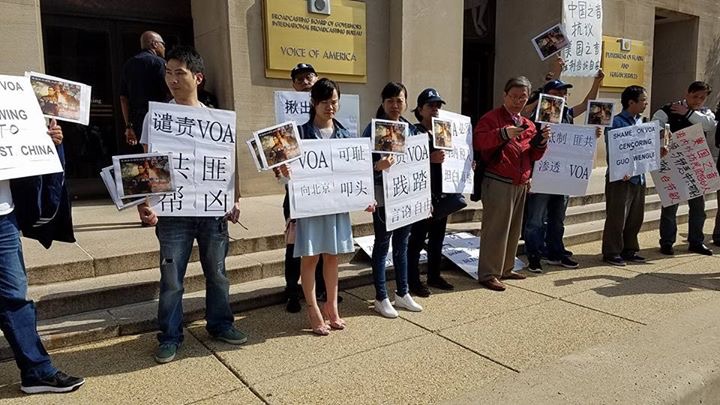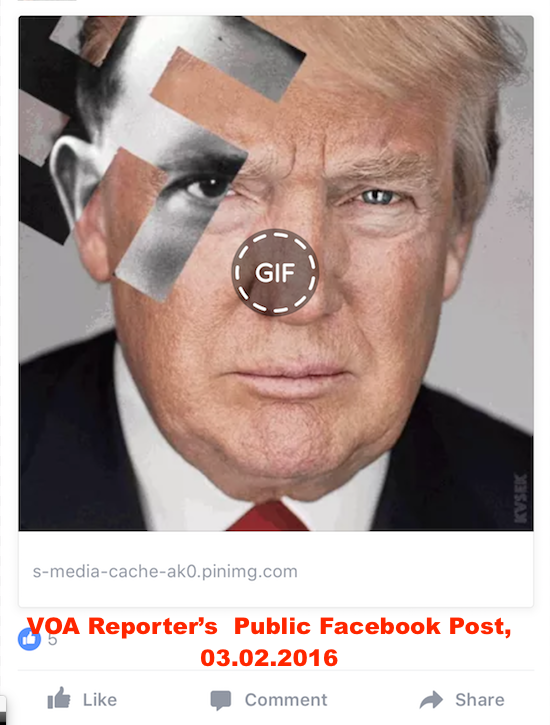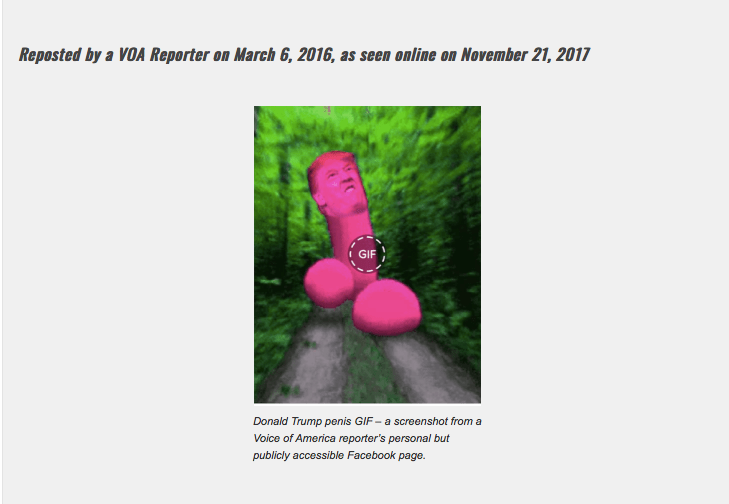OPINION
BBG Comedy Club
Part Two: The Road Show
US International Media Information War Lost
By The Federalist
In our first installment in this series, we dealt with a Broadcasting Board of Governors (BBG) press release of March 16, 2017 with the bodacious headline:
“U.S. government’s media agency targets Russian disinformation and Iranian censorship. BBG at the forefront of National Security Strategy implementation.” (emphasis added)
This last statement is a total BBG fantasy.
On March 20, 2018 The Heritage Foundation hosted a panel discussion on US public diplomacy. The two-panel, two-hour discussion, “Public Diplomacy Challenges for the Trump Administration,” can be viewed on the Heritage Foundation website and also on YouTube:
We refer you to the videos for context, the order of appearance and questions from the audience. The audio is best listened to on headphones.
Our focus is on the first panel including:
John Lenczowski (PHD), president, Institute of World Politics
Haroon Ullah (PHD), chief, BBG strategy office
Thomas Hill, Visiting Fellow, Governance Studies, Brookings Institution
Helle Dale, Heritage Foundation Fellow, moderator
Following remarks by Heritage founder Edward Feulner and Ms. Dale, the panelists made their presentations.
First was John Lenczowski. From 1981 to 1983, Lenczowski served in the State Department as Special Advisor to then Under Secretary for Political Affairs Lawrence Eagleburger. According to information in his Wikipedia bio, confirmed by former VOA managers who knew him, Lenczowski’s highest priority in the 1980s was “strengthening Radio Free Europe/Radio Liberty (RFE/RL), so that it could overcome Soviet jamming and rapidly disseminate news of resistance to Soviet authority.” (Ironically, what VOA and RFE/RL’s Radio Farda did extremely well last December was to disseminate rapidly and extensively the warnings of the mullahs regime in Iran against the pro-democracy demonstrators.) From 1983 to 1987, Lenczowski was Director of European and Soviet Affairs at the National Security Council. In that capacity, he served as principal Soviet affairs advisor to President Ronald Reagan.
From his perspective, the State Department does not care about relations with people but rather with governments and global business interests. He also lamented what he views as “the steady destruction of the Voice of America.”
Third in the presentation was Thomas Hill who, prior to his fellowship at the Brookings Institution was a longtime senior staffer on the House Foreign Affairs Committee. Mr. Hill detailed concerns about the direction of the BBG. He made note that former Secretary of State Hillary Clinton labeled the agency in 2013 as “practically defunct.”
Mr. Hill also brought up the VOA Charter and the three components to the Charter. He believes that the agency emphasizes the news component of the Charter over the other two components. Mr. Hill also questioned whether or not the agency (conforming to part three of the Charter) effectively advances US policy.
What “Firewall?”
Much is often made of the concept of a “firewall” between the BBG and the rest of US Government, in particular the White House and the Congress. BBG insiders use the “firewall” term to assert “independence.” We have often noted that the agency is not independent from the rest of government particularly in the Executive Branch. As Mr. Hill pointed out, the term “firewall” does not exist in any legislation, but rather as language in a conference report.
Mr. Hill also noted that it is not the intent of Congress that the BBG compete with US domestic media.
Mr. Hill also believes there is now an opportunity to accelerate the move to reform the agency with more far-reaching legislation possible.
But what is perhaps most important from the BBG press release is that senior agency officials are more than willing to throw VOA “journalists” under the bus if is suits their agenda to preserving their positions without regard for the stale refrain from the VOA newsroom about “journalistic integrity.” Some of the most outrageous partisan, one-sided reporting, which favored and supported President Obama’s policies while now attacking President Trump’s policies and his character in truly unprecedented ways, has continues unabated under the watch of the same Obama era appointed officials and their bureaucratic enablers.(See images in footnotes.)[ref]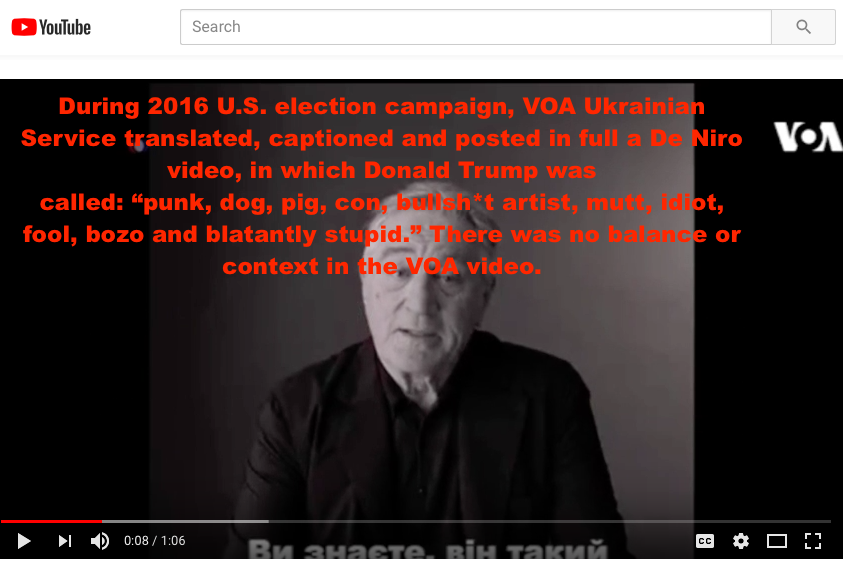
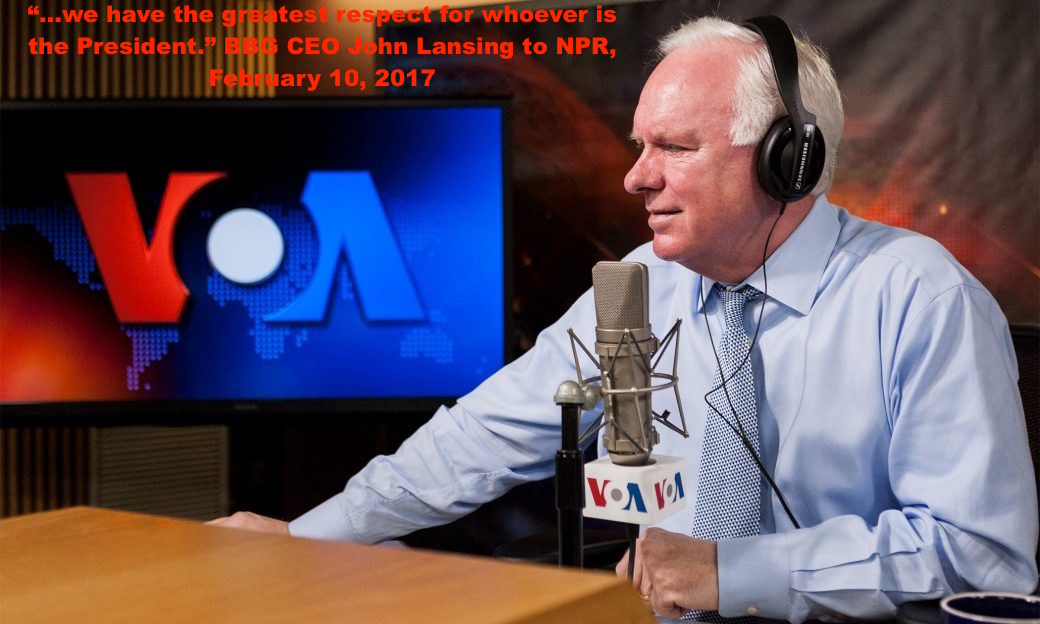 [/ref]
[/ref]
There is no such thing as “integrity” in an agency wallowing in its own form of corruption, partisanship and bias.
The second panelist was Mr. Ullah of the BBG.
Much of Mr. Ullah’s presentation was a restating of what was found in the BBG press release of March 16, 2016 which we discussed in an earlier commentary.
Ullah’s presentation amounted to no more than showing the BBG being on the defensive, repeating many of the unilateral declarations to be found in the press release but also expanding the points in an attempt to make his argument.
In our view, the press release is a false narrative, claiming successes where they do not exist. Making a public presentation based on the press release only makes matters worse, especially among individuals knowledgeable of the agency’s performance throughout most of the 21st century.
Ullah’s rosy portrait of the agency stands in stark contrast to that offered by John Lenczowski’s characterization of “the steady destruction of the Voice of America.”
Mr. Ullah mentioned a data-driven strategy for the agency although he provided little in the way of a detailed explanation of the strategy or of the methodologies employed.
He also mentioned the agency having (yet another) strategic plan and gave some glimpses into that strategic plan.
Ullah noted that there are no borders in the information battlefield. From there, he offered two perspectives on the agency’s strategy which seem to take the agency further away from global effectiveness:
1. Diaspora Populations
Ullah noted that the agency is targeting “diaspora” populations which we take to mean people who have migrated out of strategic target areas (such as Russia, Iran, China and elsewhere).
There is nothing new here. These populations have always had access to agency program content and in the past were generally supportive of the Voice of America and Radio Free Europe and Radio Liberty. These days, they no longer are, but Mr. Ullah failed to to notice or mention this disturbing fact.
Chinese Americans, for example, have been severely critical of VOA programs since the Guo Wengui interview was cut short on April 19, 2017 on the orders of VOA director Amanda Bennett and her deputy Sandy Sugawara. Some Chinese Americans even staged a mock funeral in front of the VOA headquarters in Washington, DC in protest against what they see is censorship of VOA broadcasts to China by the upper management in response to pressure from the Chinese communist government. VOA and BBG executives deny that they have caved in to pressure from China, but many Chinese, in China and in diaspora, do not accept these denials and have been brutal in their criticism of the VOA director on social media.  [ref]
[ref]
Voice of America censors a report on Guo Wengui https://t.co/eqTHyEBC04
— BBG Watch (@BBGWatch) October 6, 2017
Thank you BBGWatch! Protect our freedom of speech
— 贵在行动 -推特党宣传部长(自封) (@tuiqiandang) October 6, 2017
Thanks for speak out for justice and freedom!
— 驱除俄狗恢复中华 (@sadanduo) October 6, 2017
龚提问时我在想她代表谁尼?VOA?不是还在停职中嘛?
— Snowkoal (@cpecc1968) October 6, 2017
VOA has become VOC, voice of Chinese kleptocracy! It's time to close it.
— Alan✊️ (@jcintertronic) October 6, 2017
Wow what a fantastic article by BBG Watch ! This is called true check and balance! Thank you so much!!!
— 麦哥✊️✊️✊️ (@Dinggwg2017) October 6, 2017
voa has violated the Voice of America Charter @VOANews pic.twitter.com/QZlQbgzCDO
— 推特地下党新闻发言人✊✊✊ (@tuituji1) October 7, 2017
VOA is dead
— 雨夜惊慌 (@rainnightpanic) October 7, 2017
I used to watch VOA, but since Guo's interview in April cut short abruptly, I have been watching Mingjing, instead of VOA.
— Susan 李 (@susan_li_aus) October 7, 2017
As one of hundreds of thousands followers of Mr Guo, I know many Chinese share the same view with me about VOA, and Mr Guo.
— Susan 李 (@susan_li_aus) October 7, 2017
article! I saw VOA advertising in googles. They have realized they have lost a lot of viewers. It is time for change.
— 2017 期待改变 (@live4emoment) October 6, 2017
— Sylvia (@we2in1) October 7, 2017
— 自由中華 (@ziyouzhonghua) October 7, 2017
[/ref]
Also, several China scholars in the U.S. criticized in an open letter to the Broadcasting Board of Governors reprisals by senior management against some of the VOA Mandarin Service broadcasters whom these prominent scholars defended as being “among the best in the Chinese journalistic community worldwide.”
Iranians in diaspora, Iranian Americans, including prominent experts and scholars, and anti-Islamist regime Iranian protesters in Iran have been likewise highly critical of the Voice of America and Radio Farda.[ref] [/ref] The latter is also managed by the Broadcasting Board of Governors within just as dysfunctional Radio Free Europe / Radio Liberty (RFE/RL).[ref]
[/ref] The latter is also managed by the Broadcasting Board of Governors within just as dysfunctional Radio Free Europe / Radio Liberty (RFE/RL).[ref]
One of the most important things the US gov can do right now on Iran is to fix VOA Persian & make it a more effective organization in line with US interests. The war of ideas & information matters more than ever before. #iranprotests
— Alireza Nader (@AlirezaNader) April 4, 2018
Having reformist pro Islamic Republic guests, hosts and personalities on @VOAIran funded by taxpayers should become as shameful as having pro Nazi or pro communists on the channel. @VOAIran @BBGWatch https://t.co/90fPjfn6nh
— Amir Fassihi (@AmirFassihi) April 5, 2018
Dear @BBGWatch, the #ReformBBG should be accelerated if @realDonaldTrump administration really seeks a peaceful transition in #Iran. Thank You 🙏 @VP pic.twitter.com/3FpQtc3m3z
— Kaveh Taheri 🕊 (@TaheriKaveh) April 6, 2018
@PahlaviReza says regime's supporters & lobbies have infiltrated USG-funded @VOAIran & @RadioFarda_ and promote pro-regime so-called "Moderates" through them.#ReformBBG@SenRubioPress @isg2 @AndrewLPeek @RepEdRoyce @SenTomCotton @RepDeSantis @leezeldin @RepKinzinger @BBGWatch https://t.co/7ZJS1yN74S
— Amir Etemadi (@amiretemadi) February 11, 2018
شاهزاده رضا پهلوی: نیروهای اصلاحطلب و لابیهای جمهوری اسلامی به صدای امریکا و رادیوفردا رخنه کردهاند و همچنان به دنبال ادامه حیات رژیم با ترویج گفتمان اصلاحطلبی هستند. این رسانهها باید پاکسازی شوند و از خواست اصلی مردم یعنی از بین رفتن اساس این حکومت، حمایت کنند @PahlaviReza pic.twitter.com/E6eReOR5q9
— Taghato (@taghato) February 11, 2018
#ReformBBG is one of the most important issues, which can help #IranProtests succeed, should @POTUS @realDonaldTrump admin really wish to support the Iranian people. pic.twitter.com/iLIIMMoznF
— Kaveh Taheri 🕊 (@TaheriKaveh) January 8, 2018
از دولت آمریکا می خواهیم در راه کمک به ملت #ایران و ثبات منطقه ای و صلح جهانی تغییرات اساسی در رسانه های دولتی خود ایجاد کند.
We need to #ReformBBG as soon as possible @BBGWatch@USAdarFarsi @WhiteHouse @StateDept— Faranak Azad (@FaranakAzad1) February 12, 2018
@PahlaviReza calls for a clearing of #iranlobby and reformists from @VOAIran @RadioFarda_Eng @BBGWatch @BBGgov https://t.co/A48j6tbr8V
— Artin (@artindiplomacy) February 11, 2018
Again, who exactly is paying their salaries, IR or USA?
From their behavior I find it quite confusing.— Darkseid (@DoctorDoom2) February 8, 2018
Clearly not. VOA leadership is oblivious to criticism.
— KenTimmerman (@KenTimmerman) February 8, 2018
The time for change at the Broadcasting Board of Governors and the Voice of America is long overdue. If nothing else, what needs to change is how BBG and VOA officials view and treat Americans who pay their salaries.
— Gity Behi (@gitybehi) February 8, 2018
[/ref]
It would be wise for Mr. Ullah to consult with Chinese American and Iranian American experts before making public statements about diaspora communities and their view of the Voice of America and the Broadcasting Board of Governors. We don’t know for sure how much impact these dispersed diaspora groups have on the target areas, but it is also obvious that the Chinese in China and the Iranians in Iran now have a very low opinion of the Voice of America and, in the case of Iran, also of Radio Farda.
2. Narrowing the Audience
From there, Ullah attempted to make the case that “the narrower the audience, the greater the impact.” But we know that the management has been buying Facebook ads at taxpayers’ expense to get worthless clicks and encouraging posting animal videos as click bait to attract anybody they can find.
At the same time an old, old ploy by the agency is being used on Americans, including members of Congress. In the past, the agency would periodically put forward the notion that it was broadcasting to “societal elites,” in effect narrowing the audience.
But again, in this limiting impact strategy, the question becomes what does the agency expect this narrow demographic to do if both VOA and RFE/RL broadcast lengthy statements from the ayatollahs in Iran? Elites in some countries show little connection with the general population and have a vested interest in maintaining that separation and supporting repressive regimes or at least not alienating them too much. The same can be said about some of the elite members of the Broadcasting Board of Governors who have been doing corporate business in countries like China and Russia, as do family members or former employers of some of the VOA officials. What the BBG needs to target are opponents of despotic regimes, whether elite or not, because only they truly search for otherwise censored information. They don’t need VOA to tell them in great detail what the mullahs and their controlled media in Iran have already told them and they don’t need RFE/RL president Tom Kent to tell them that President Putin has brought “strength” to Russia. They don’t need self-censored VOA and RFE/RL programs so they can be placed on national networks which otherwise would not use uncensored BBG-provided content.
In the Sunday, March 18, 2016 Outlook section of the Washington Post, Keith B Richburg reviews two books on China. (Richburg is a former China correspondent for The Washington Post and is now director of the Journalism and Media Studies Center at the University of Hong Kong.)
One of the books is of particular note:
Young China: How the Restless Generation Will Change Their Country and the World
By Zak Dychtwald
St. Martin’s, 293 pp. $25.99
From Richburg’s review:
“The young Chinese (Dychtwald) profiles are searching for means of individual expression, any way to differentiate themselves from the masses…
Also enlightening is learning that China’s millennials consider censorship more of an occasional annoyance than a major intrusion on their daily existence. They are vastly more concerned with following the rise and fall of property prices, swapping articles and videos among friends in their personal WeChat groups, and finding the best prices on the massive online shopping site Taobao. ‘We get that we are censored…It’s annoying, but we get what is going on (according to one Chinese interviewed for the book).’”
If Ullah and the VOA are looking at this demographic, it strongly suggests the agency doesn’t know its audience.
On a roll, Ullah then attempted to challenge well-established and documented assertions regarding the agency. He labeled them as “myths” which they clearly are not.
Here are Ullah’s “myths:”
1. The agency is too slow in reform/modernization.
Not once did Ullah clearly articulate what required the agency to reform. Instead, he fell back on programming which didn’t help him make his argument. In particular, he threw out the outrageous unilateral agency claim that “Current Time,” directed at Russia has had over 400-million views in ONE YEAR. That is a preposterously misleading claim because “Current Time’s” web traffic ranking in Russia and its impact as dismally low, even compared to some low-budget semi-independent Russian news websites or even individual bloggers.
Mr. Ullah and the BBG apparatchiks are living in a fantasy world.
Consider the observations of outgoing White House national security adviser HR McMaster, quoted in an April 4, 2018 Washington Post editorial:
Just a couple quotable quotes:
“Russia brazenly and implausibly denies its actions, and we have failed to impose sufficient costs.”“The Kremlin’s confidence is growing.” (emphasis added)
Not once in HR McMaster’s remark did there appear any mention of the BBG as some kind of bulwark against the Russians in general or Russian disinformation in particular.
Why?
Because it isn’t.
Vladimir Putin can easily deride the BBG program “Current Time.” It isn’t having nor is it likely to have any material impact on Putin, the Russian government or the Russian people all of whom enjoy Russia’s rising star. That is not to say that that everyone likes Mr. Putin. But it is hard to argue against success as the Russians may view the Putin strategic objectives.
Mr. Ullah does what other current and former agency officials have long done: selectively cherry-pick a narrative that sounds great but has no substance.
2. We want to cut radio.
Mr. Lenczowski puts Ullah’s denial to rest. One can easily go back over the last 20 years to see the decline in radio/direct broadcast programming. One can examine number of hours and the size of radio production and technical staff needed to produce radio broadcasts. They are not growing. They are substantially reduced.
3. At BBG we’re all bureaucrats.
All one need do is examine the agency’s staffing pattern to determine the size of administrative/support functions compared to operational staff, particularly the agency’s International Broadcasting Bureau to debunk Mr. Ullah’s claim.
4. We’re (the BBG) not effective.
We refer you to HR McMaster’s comments. It’s one example. Another is Hillary Clinton’s 2013 comment or the fact that RFE/RL, despite its heavy and costly presence in Russia or perhaps because of it, never discovered in real time Russia’s interference with the 2016 U.S. presidential election, while the Voice of America was running Hilary Clinton campaign ads and attacking Bernie Sanders in a commentary. There are others who see the BBG’s lack of effectiveness. President Obama was among them as he ignored the agency and eventually signed the legislation that would abolish the agency’s board. As we already pointed out, besides Russia, the agency has substantially declined in impact in China, Iran and elsewhere. As noted above in the Zak Dychtwald book, it is evident that the agency doesn’t know the audience it is intending to reach in China. And Mr. Ullah also avoids noting the criticism directed at the VOA Persian Service’s coverage of recent unrest in Iran as “the voice of the mullahs.”
5. We are not competing.
At times, it’s hard to determine who the BBG thinks it is competing with. At times, one sees the agency and its individual reporters attempting to establish credibility with the Washington Post, its readers, and domestic US cable broadcasters. At others, maybe it’s international broadcasters, the Russians being the more visible entity.
With the agency, the picture is one of attempting to compete with everyone but ending up competing with no one.
“We want to do better.”
This phrase popped up frequently in Mr. Ullah’s presentation.
It has to be one of the greatest understatements of all time, this being the “baby steps” agency in its approach to its systemic problems.
What makes it even more of an understatement is that it is patently false.
This agency does not want to do better. It has become very comfortable with mediocrity and a thoroughly corrupt bureaucratic regime.
Instead, what the agency really wants is for people to believe it is doing better absent any objective criteria of measurement.
There is no commitment on the part of the agency to substantive reform.
Indeed, at the slightest hint that reform may be on the way, the BBG “thugocracy” kicks up a storm as so called “whistleblowers” creating fake news and wild claims of a “coup” by one or another individual inside the Cohen Building who is seen by the core cabal as a threat.
The agency has established itself as one of the worst places to work in the Federal Government as seen repeatedly in the Federal Employee Viewpoint Survey, year after year. Senior agency officials dismiss employee morale as a concern.
And it isn’t to them.
They feel smug and secure in their six-figure salaries, bonuses and bogus justifications in their performance evaluations.
We know these people very, very well.
To put it mildly, none of them would be working for us.
But as long as they maintain a stranglehold on the agency, expect the Russians, the Chinese communists, the Iranian mullahs, their lobbyists and others to roll over the US in the arena of global public opinion.
It is long past the time to clean house at the BBG.
The Federalist
April 2018
